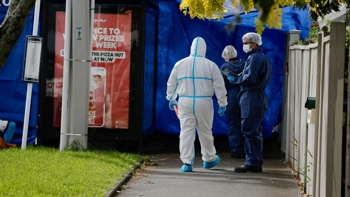KiwiRail has revealed this morning’s signal failures across the Auckland rail network were caused by an IT staffer doing unsanctioned work on the rail’s firewall.
It comes as a public transport advocate has called for an immediate Government inquiry into the Auckland rail network after further commuter delays today.
In a statement this evening, KiwiRail general manager Jon Knight said an IT staff member was doing a diagnostic on the firewall that protects its train control system this morning after a potential problem had arisen.
“This type of work has to be done at night, when services aren’t running. There are clear processes in place but these weren’t followed,’ Knight said.
He said the system lost connection to its infrastructure in the field and switched into safe mode, stopping all trains as a safety precaution.
Signals across Auckland went down for 13 minutes, resulting in affected services being delayed by between 10 and 40 minutes.
“The staff member was looking into it with the aim to resolve any issue... The matter will be investigated further,” Knight said.
“I appreciate how disappointed and frustrated Auckland commuters must be following the series of disruptions over the last month. KiwiRail, Auckland Transport, and Auckland One Rail are working closely together to take steps to reduce the level of disruption.”
Now, the Public Transport Users Association (PTUA) has called for the Government to step in for the sake of Auckland rail passengers.
“We need a Government inquiry to find out whether the way Auckland is running is actually adequate, because all signs are showing that it’s not,” said national co-ordinator Jon Reeves.
- Heat-induced speed restrictions result in cancelled trains
- Train users warned to expect delays after earlier cancellations
- Auckland Transport lashes out at KiwiRail over track 'heat' issues
- Govt's new water legislation aims to be neither "hopelessly local" nor "mindlessly central"
Reeves was concerned that the year had already been a “disaster” for Auckland commuters, just six weeks after it began.
“You’ve got KiwiRail running the tracks and trains, the Australian-Singapore company Auckland One Rail doing something in between but making profits and sending it overseas and Auckland Transport trying to manage it and at the end of the day, we’ve got a mess,” Reeves said.
On the reliability of the Auckland rail network, Reeves said it had become worse since the tracks were reopened after a large summer of rail closures for works to be conducted.
“Auckland’s rail network is a complete embarrassment by comparison to overseas rail systems, none of them are going through this.
“It’s no longer a joke for rail commuters, the joke ended a couple of years ago,” said Reeves.
General secretary of the Rail and Maritime Union, Todd Valster, said when the signal fails, it automatically defaults to red.
“This signal failure, while it would have inconvenienced the travelling public and staff ... do not put passengers and staff at risk,” Valster said.
“There are procedures for safe running if the signals failed for a longer period.”
Dr Timothy Welch, a senior lecturer in urban planning at the University of Auckland, said today’s signal failures had the potential to “wreak havoc” on the network.
Welch said while today’s issues weren’t so much dangerous, it would completely throw a train timetable off.
“It’s really concerning because it does impact people’s confidence in public transport at a time when we’re really trying to boost ridership back up and when we’re seeing numbers start to climb again,” he said.
Welch said if frequent issues continue, it was likely Auckland commuters would turn to other forms of transport.
“We’re underdeveloped in our rail system as it is, so even when our fairly limited rail system starts to become unreliable, it is concerning for sure,” he said.
More than 1300 train cancellations in just over a month
The fresh set of delays and cancellations came as it was revealed that between January 15 and February 22, there were 1303 AT train trips cancelled. This is three times higher than in previous years.
The top three causes were track speed restrictions (including heat restrictions) with 306 cancellations, motor point issues on 189 and temporary train manager shortage with 184.
Cancellations peaked between February 5 and February 11 with 386 cancellations that week.
Trains across Auckland were cancelled last week due to the “heat”, which caused significant disruption to rush-hour commuters and prompted AT to lash out at KiwiRail.
Last week, AT said potentially one in every three train services will be cancelled and the commuter chaos could continue until March.
KiwiRail said it would be carrying out an “aggressive plan” to fix the issues.
AT’s director of public transport Stacey van der Putten said it was “enormously disappointing” the transport body had to cancel services because of speed restrictions put in place by KiwiRail on the network due to “hot tracks”.
“These speed restrictions would be unlikely to be needed today if the Auckland rail network was not vulnerable because of numerous known faults,” van der Putten said.
Benjamin Plummer is an Auckland-based reporter who covers breaking news. He has worked for the Herald since 2022.
Take your Radio, Podcasts and Music with you









